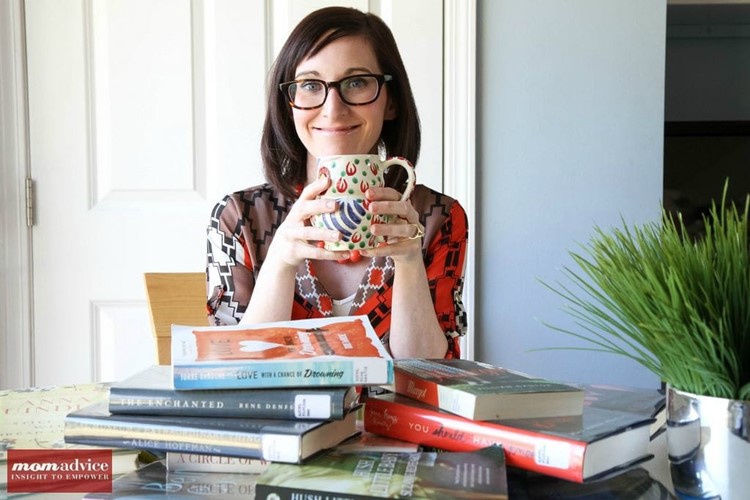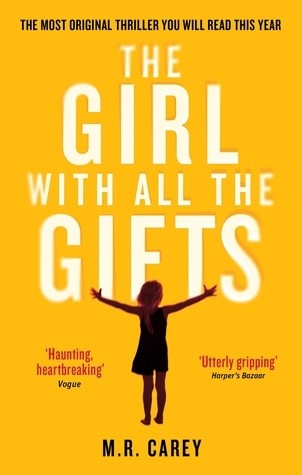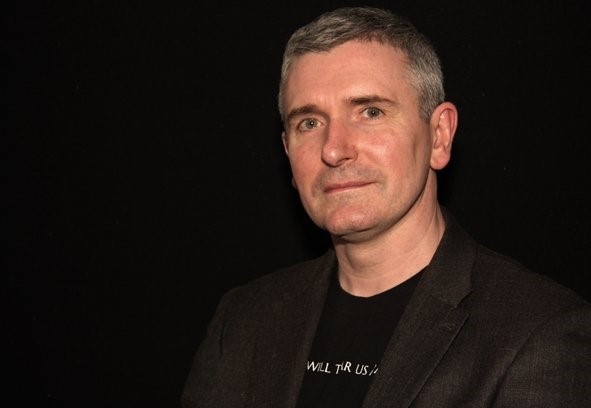
Do you ever pick up a book completely outside of your normal genre and find yourself completely swept away in a world you never dreamed you would escape to? It happened a couple of times for me with The Hunger Games series and Twilight series, just to name two types of books that I never thought I would love. Last week if you would have asked me if I would have fallen head over heels in love with a book with a plotline firmly planted in science fiction with a zombie apocalypse theme or even just another dystopian thriller ( a genre I had grown very tired of), I would have probably laughed at you.
No, this is not your typical recommendation on here and that is exactly why I had to feature it today. It is different and it is awesome.

I fell head-over-heels in love for The Girl With All the Gifts. I can tell you now that this will be on my top ten reads of 2014 because I can’t stop thinking about it and have the urge to reread it all over again. It is a true adventure of a read that grabbed me and did not let me go until the final pages.
My husband is not a big reader like me, but when I finished the book and described it to him, he picked it up one evening after my encouragement. I did not see or speak to him for two whole days. He was just as swept away in this book as I was. For this reason, I would definitely recommend this one as a great couple’s book selection and definitely not limited to our female audience.
After I finished it, I emailed Mike Carey (who is using the pen name M.R. Carey for this book) and never in a million years expected a response. You see, Mike is quite a big deal. He is an established British writer of prose fiction and comic books. He has written for both DC and Marvel, including critically acclaimed runs on X-Men and Fantastic Four, Marvel’s flagship superhero titles. His creator-owned books regularly appear in the New York Times graphic fiction bestseller list. He also has several previous novels and one Hollywood movie screenplay to his credit.
And he answered my message and said he would love to share his book with you all.
I have taken my fangirl status to another level entirely after this interview and can’t wait to see this book adapted into a screenplay.
All the descriptions of this book state that Melanie is simply a special girl. You don’t know what makes her special until you dive in and discover the girl and all her gifts.
This book is wildly imaginative, suspenseful, and leaves you wondering who you should be rooting for as the story develops. I really, really loved this book. Unfortunately, it is just the kind of book that you shouldn’t talk about so that each reader can go on the journey with this child and find out just what makes her so unique. It’s a book that you will want to finish and share with friends. It reads like a movie and is just the type of literary adventure I would recommend if you have been in a reading slump this summer.
Grab your coffee and let’s have a chat with the amazing Mike Carey about his book…

I loved this book so very much and it is unlike anything that I have ever read before or will ever read again. Thank you for such a fantastic escape this summer. I discovered that it was based upon the Edgar-nominated short story, Iphigenia in Aulis that you had written. Why did you decide to take this short story and expand it into The Girl With All the Gifts?
Thanks! I’m really glad you enjoyed it.
The story had an unusual genesis – or unusual for me, at least. I’d been invited to contribute to a themed anthology edited by Charlaine Harris and Toni Kelner. They do these books every year, and the theme is always something deceptively innocent and everyday – home improvements, family holidays or whatever. This particular year the theme was schooldays.
And I said I’d do it, but then I had no ideas whatsoever. Inspiration didn’t strike.
Until about three weeks before the deadline, when suddenly I woke up with this image in my mind of a little zombie girl writing an essay in an abandoned classroom. “What I want to Do When I Grow Up”. The whole story grew from that – from Melanie, and her situation. I wrote it in four straight days and sent it in, and Charlaine and Toni said it fitted the bill perfectly.
But I had the sense as soon as I hit SEND that Melanie’s story wasn’t finished yet. It felt as though the ending, in which she and Sergeant Parks fight back-to-back against an army of Junkers in order to cover the evacuation of the base, wasn’t really earned. And it felt like there needed to be much more a pay-off for Melanie’s relationship with Miss Justineau (who in the short is called Miss Mailer).
So I pitched it to Orbit as a novel, and they commissioned it – even though that meant amending my contract in some complicated ways. And at the same time I pitched it as a movie concept to a producer I was already working with. The two version of the story grew up side by side.
You make a very conscious decision to never use the word, “zombie.” Why did you not want to use this word in your book? Was this meant to lead the reader into their own conclusions when they begin the story?
It’s partly that – although the reveal comes quite early, really. It’s also a question of trying to make the reader keep an open mind. I was conscious that zombies for a lot of people are an overworked trope and a fairly limited one. I was coming at it from what I thought was a new angle, and I hoped that if I held off on the Z word readers would stay with it until they were emotionally invested.
It’s rebounded against me in some ways. I’ve read a few reviews where the reviewer has said “you know, this is reasonably realistic in some ways, but if you’ve got a zombie apocalypse going on why wouldn’t you just call it one? That doesn’t ring true at all…”
In one scene, Dr. Caldwell says to Mrs. Justineau, “You should ask yourself why you’re so keen on thinking of me as the enemy…Which weighs the most, Helen? Which will do the most good in the end? Your compassion or my commitment to my work?” Which of these characters do you think was doing the most good? Did you relate to Dr. Caldwell or Mrs. Justineau more when writing this?
Oh, I’m with Helen Justineau all the way! But I wanted readers to understand where Caldwell was coming from. Nobody sees themselves as evil. They explain away the things they do as being forced on them by circumstances, or serving a greater good, or whatever it might be. Caldwell is trying to save humanity. She’s also trying to earn a sort of personal immortality through her work, and to prove that she’s better than the scientists who were promoted over her, but she genuinely believes she’s doing good – and that the ends absolutely justify the means.
There’s a beat near the end of the book that really only works if you can empathise with Caldwell at least a tiny bit. It’s when she and Melanie have their conversation about the infection, and Caldwell realises that if anything of her work is going to survive it will be through her being able to explain it to Melanie now. The child she was going to sacrifice is the last slender reed she can grab hold of. If you don’t care about Caldwell at all that’s just ironic. I wanted it to have a little touch of tragedy to it.
Where are you in development of the screenplay of The Girl With All The Gifts? Do you have anyone in mind for your dream cast?
The screenplay is written and we have a deal in place. I’ve never been this far along with a film project before – well, once a long time ago when I wrote the screenplay for an animated version of Tristan and Isolde, but I generally avoid talking about that.
This time around it’s been an amazingly rewarding and enjoyable process. The movie and the novel grew up together and kept swapping DNA. We went a slightly different way in the movie, especially when it came to point of view. Where the novel moves between the five main characters and lets us see what’s going on in all of their heads, the movie sticks with Melanie all the way. And there are no Junkers in the movie. The base falls to a hungry attack. But it’s a case of two different paths through the same narrative space. The ending is absolutely faithful to the book.
I’m going to duck the question about casting if you don’t mind. That’s where we are at the moment, and I’m crossing every finger and toe I’ve got that we get the Justineau and Caldwell who are currently reading the screenplay.
The science in this book is quite astounding. Can I admit that my own brain may have exploded at times from all the scientific detail that you developed in it? Was there a lot of research on your end to develop these portions of the book, particularly developing the plotline with the infection that is based upon the ants?
A fair bit, yes. In the short story I glibly described the hungry pathogen as a virus, probably with 28 Days Later at the back of my mind. But when it came to writing the novel I had to put my money where my mouth was and I realised very quickly that a virus wouldn’t do. They have very simple, linear life cycles. I wanted something more baroque and multi-staged that would provide a plausible puzzle for Caldwell and would also allow for the events of the climax.
Enter Ophiocordyceps unilateralis. To be honest, I’d already seen the David Attenborough footage of the zombie ants, so I was rediscovering this weird parasite rather than reading about it for the first time. But it was obviously perfect for my needs. And once I’d made the decision that the infectious organism should be a fungus, it just kept on giving. It made for some visuals that I’d never come across in the post-apocalyptic fiction I’d read and that had the potential to be very powerful.
There were also other things I had to look into, like how you take a brain out of a skull. That was one of the hardest scenes to write.
Without giving it away, the ending that you create was just perfection. Is this where you always knew Melanie’s journey was heading or did it develop as you developed the story?
I always knew that Melanie was going to face that choice. She’s Pandora, after all. She has to find the box and make the decision whether or not to open it. And the box has to be full of monsters and terrible evils, but it also has to contain at least the promise of hope.
But the details were quite vague, and they firmed up as I wrote the story. I’m not sure that Rosie was in the original pitch. The feral children were, but they were just a placeholder. I had no idea how Melanie’s fight with them would play out, beyond the vague feeling that she would have to use the environment in intelligent ways that they didn’t see.
It’s always a mixture of planning and serendipity. You know where you’re going in the broadest sense. But you don’t know what you’re going to gather along the way and so the ending, when you get there, is both familiar and surprising.
Did you ever have a teacher like Mrs. Justineau? What teacher inspired you the most in your own career?
This is going to make me blush. When I was seven years old, my teacher was Miss Bimpson. I had a huge crush on her. She was clever and funny, her lessons were great, but she was also most extraordinarily kind. One day when I was crying my eyes out about something – a totally mundane something that seemed like the end of the world to me – she sat me on her lap and hugged me until I stopped sobbing. That’s probably the origin of the scene in which Miss Justineau strokes Melanie’s hair.
But probably the most inspiring teacher I ever met was George Lucy, who taught English at the comprehensive school I attended from age eleven. George was one of those teachers who thinks the curriculum is something that happens to other people. Boring people. He taught whatever he was most passionate about, and I learned from him to interrogate limits and push past them if they’re not real.
He also tutored me for my Oxford entrance exam. I come from a solid working class background and there were a lot of holes in my academic knowledge. George lent me books – dozens of them – from his own collection and generally gave me the tools I needed to sit those papers. He changed my life in a lot of ways.
Since you are also a comic book writer, can you picture this book being developed into a comic book or even a comic book series? Who would be your dream illustrator for this?
I would love to write a Girl With All the Gifts comic book. The only possible artists for a project like that would be Peter Gross or Mike Perkins. And Mike has already covered the whole post-apocalyptic genre with his epic version of Stephen King’s The Stand, so he might well say no.
Will there be a sequel for Melanie?
I don’t think so. There are other stories to be told around her story, and I could imagine going back to tell one of those. Perhaps a story with an entirely different cast, taking place at the exact same time as GIRL. Or perhaps a story from a generation later. But I don’t think Melanie would be the protagonist in either of those.
You reach a point, with most characters, where you feel that their story has been told. I’d love to revisit the world of Lucifer, but I wouldn’t dream of bringing Lucifer himself back into it. It’s the same with Melanie. I’d be wary of weakening her story by adding extra beats to it.
If you could tell anyone to read one book (other than your own) what would that book be?
So many possible answers to that! You could ask me a couple of dozen times and get a different answer each time. Today I’m going to say The Shadow Of the Torturer, by Gene Wolfe. It’s the first volume in a tetralogy, so if you read it and liked it you’d have to read the other three. But they’re so worth it. It’s a story of a far future Earth where the sun is dying. Humanity has spread to the stars but that was long ago. Now there are other galactic empires, other non-human civilisations that call the shots. What’s left of humankind is back on an old, old planet that hasn’t got much time left to it. But there’s a Messianic religion that preaches that the New Sun, sometimes known as the Conciliator, will be born on Earth as a man and rekindle all our hopes. Reborn, rather, since he’s been here once before. And Severian of the Torturers’ Guild believes this to be true since he’s found a holy relic, the Claw of the Conciliator, that heals all wounds.
It’s a very hard book to describe, and there’s no denying that it goes to some very dark places. But Wolfe’s imagination is vast. He creates a world and peoples it. And he has a very serious purpose which takes in faith, physics and the importance of storytelling.
You can connect with Mike Carey on GoodReads and on Facebook! I’m always thankful for these moments with writers and I hope you will pick up this amazing book!
You can always connect with me on GoodReads,through our books section of our site, and you can read our entire Sundays With Writers series for more author profiles. Happy reading, friends!
*This post contains affiliate links!
Pin It